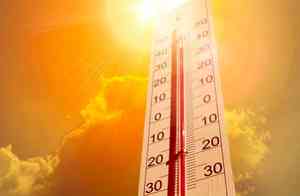Any change in weather can also impact your blood pressure
Weather has long been associated with various health conditions and human well-being, and one significant area of interest is its potential impact on blood pressure (BP). Blood pressure regulation is essential for cardiovascular health, and fluctuations can have implications for overall well-being.

By Shrey Srivastava
New Delhi, Aug 5 (IANS) Weather has long been associated with various health conditions and human well-being, and one significant area of interest is its potential impact on blood pressure (BP). Blood pressure regulation is essential for cardiovascular health, and fluctuations can have implications for overall well-being.
According to experts, during extreme summer weather, the body attempts to radiate heat which affects blood pressure levels. An increase in temperatures and humidity can raise blood flow to the skin, causing the heart to beat faster while circulating twice as much blood per minute than on a normal day.
The greatest risks are when the temperature is above 70 degrees Fahrenheit and the humidity is more than 70 per cent. The higher the humidity, the more moisture in the air.
Some people are at higher risk of being affected by humidity, including those who are over age 50, overweight or have heart, lung or kidney conditions.
"Blood pressure readings are usually slightly higher in winter compared to summer. It can be attributed to cold temperatures causing vasoconstriction (narrowing of blood vessels), leading to an increase in BP. It may also be related to shorter days, less activity, or weight gain during the winter months," Dr Manish Hinduja, Consultant, Adult Cardiac Surgery, CVTS, Kokilaben Dhirubhai Ambani Hospital Mumbai, told IANS.
"It is important to note that not everyone is equally affected by weather changes. Also, the fluctuation is usually not so much to change the dose of BP medicines in the majority of the patients," he added.
However, it is recommended to monitor your BP regularly and follow your doctor's advice during extreme weather conditions.
Dr Nagendra Singh Chouhan, Senior Director of Interventional Cardiology, Heart Institute, Medanta Gurugram said: "When we’re getting out of bed early in the morning, the blood pressure goes up. There are certain times when blood pressure goes up. The first hour when we wake up is very critical, after that, our blood pressure goes down."
On asking whether climate change/rain affects BP, he said that rain doesn’t cause high or low temperatures. If there is a significant variation in weather, such as cold weather, then blood pressure can go up.
"While rain can cause anxiety and stress, which can be a cause for high blood pressure, rain does not have a direct relationship with blood pressure," Chouhan said.
These weather-related variations in blood pressure are more common in people ages 65 and older, however, experts suggest that a person with no BP issue needs to take precautions to not get affected by the disease.
According to health experts, eating a healthy diet (rich in fruits & vegetables, limiting salt intake, saturated and trans fats, added sugars and caffeine), and regular exercise to maintain a healthy weight (such as brisk walking, jogging, swimming, cycling, or any other aerobic exercise for at least 30 mins a day for at least five days a week) can help to avoid the disease.
They also recommend quitting smoking, limiting alcohol intake, reducing stress, and having adequate sleep (at least 6-7 hours of quality sleep at night).
In addition, it is advised to store your medications properly so that they are not exposed to extreme heat. Some medications, including insulin used to manage diabetes, can degrade when temperatures change.
Store medication in a cool, dry place.
(Shrey Srivastava can be reached at [email protected])


 IANS
IANS 









